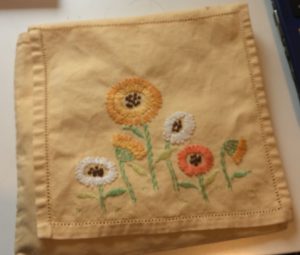This blog piece is quite late as I had two days out of action with some virus or other, so a lot of garden jobs and dye jobs did not get done. But it did give me some quiet time to think more about the next random writing projects. Several conversations about the past have triggered memories of all sorts, some nostalgic and pleasant, some painful, some reassuring as I realise that I’ve been carrying quite unnecessary feelings of responsibility for things that happened – very little out of the ordinary.
But it made me think about traditions – our accepted story about our lives, and the small random fragments that shape it. And how selective memories are. I started thinking about the things I don’t remember, not things that have slipped my mind but come back when prompted, not things I can’t remember, and have to be prompted, but things I look at and refuse, like a book on a shelf that I won’t open. It’s a strange sensation, as is the one where the memory falls open off the shelf and I’m in it.
I’m not writing about those memories – at least not yet. But I am writing about that phenomenon. It ties up nicely with the colour poems, the dyeing, the textiles poems, and a strand I’m cooking up about my grandmothers, the ones who took a stand about female education and the one who died before I was born, who survives only in her needlework.
